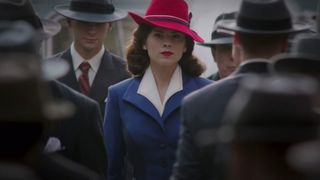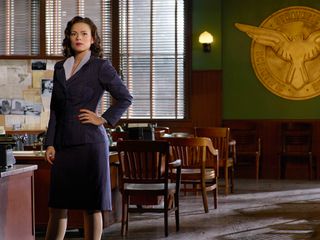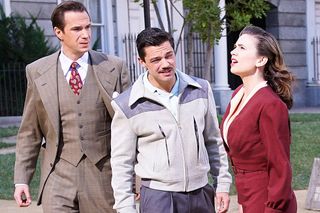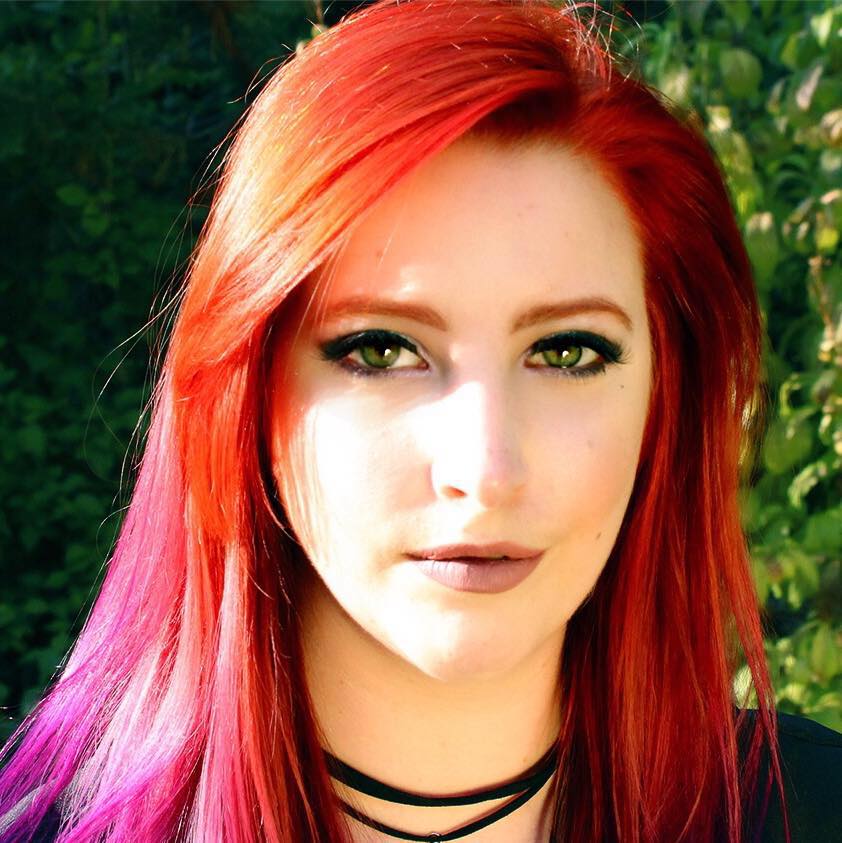
When we think of sprawling epics like the Marvel Cinematic Universe, it's easy to forget about its smaller moving parts. But without the little details, the big doesn't matter. Sometimes the "small" elements can be the entire backbone of a franchise. Enter Margaret "Peggy" Carter (Hayley Atwell), and her wonderful little show that deserved much more than what it was given.
The short, two-season Agent Carter series embodies a constant streak of strong feminism, kickass action, and several fun tie-ins to the universe as a whole. We continue to see Peggy appear in major moments in the film epic not just because she's a love interest for Steve Rogers (Chris Evans), but because the character herself serves as a critical foundation for the greater universe as a whole.
Not only is she the reason Rogers was chosen for the super soldier serum, but she's also the key founder of S.H.I.E.L.D. and one of the primary reasons Howard Stark got his act together. That is to say that without Peggy Carter, there'd be no Captain America, Iron Man, Nick Fury, Ant-Man, Black Widow (at least the hero version), Hawkeye ... the list goes on. The Avengers exist because of Peggy Carter.
While the series wouldn't last long enough for the shambles of the Strategic Scientific Reserve (SSR) to become S.H.I.E.L.D., we do get two full seasons of Peggy and Jarvis (James D'Arcy) desperately trying to whip Stark (Dominic Cooper) into shape. It may have never gotten the opportunity to go as far as it could, but the series does spend its entire runtime showing us exactly why Peggy's the right woman for the job.

Move over, boys. This is a job for a lady.
Bottom line: An engaging tale about the woman whose back the MCU is built on.
The Good
The Bad
Agent Carter What I loved
Marvel's Agent Carter follows Peggy's journey after Steve Rogers' Captain America is lost in the ocean. The Strategic Scientific Reserve (SSR) hasn't yet shuddered, but things are a little more complicated for Peg as she heads to Brooklyn and no longer has a commander who believes in her.
While Captain America's legacy lives on, Agent Carter is reduced to a smitten damsel by way of an intentionally infuriating radio show. Unfortunately, her inaccurate depiction will be the least of Peg's worries as she finds herself carving her way in a sea of men who don't believe she's worth fetching their lunch, let alone running her own missions.
Though often overlooked, Agent Carter also features some best-in-class writing, stellar fight choreography, and its fair share of factory explosions.
Thankfully, Peg makes more than a few friends along the way. The allies Peggy made within the SSR may have been invaluable, but none of them held a candle to the friends she made outside of the agency's walls. Jarvis wasn't just beloved because of James D'Arcy's incredible portrayal. He endeared himself to viewers by being Peggy's first and truest ally in a world of people who didn't believe in her. He would then maintain that fierce fan loyalty by sticking by her side in the messiest, most daunting of situations.
Peggy's circle would quickly grow to include a fierce foundation of female friends. Angie Martinelli (Lyndsy Fonseca) would set the bar immediately in the first season, offering a platonic spin on the hero/civilian trope that fans would miss in the show's second season (Fonseca was unable to return). Joining the incredible Ms. Martinelli are the wonderful Rose Roberts (Lesley Boone) and Ana Jarvis (Lotte Verbeek). Each one of these women brings something special to the series, whether it be Rose's building confidence, Angie's proud defiance, or Ana's kindness in the face of extreme adversity. Though the majority of them don't cross paths, each one plays a critical role in our protagonist's story.
Those are the nuts and bolts, but let's take a look at what makes the series tick.
Though often overlooked, Agent Carter also features some best-in-class writing, stellar fight choreography, and its fair share of factory explosions. Say what you will about small screen action, but there's an entire scene where Peg beats the crap out of a room full of enemies with a stapler. Plus, one later in the series where she does the same with a clipboard. Eat your heart out, John Wick!
When it comes to character development, there's never a moment when you don't believe that Hayley Atwell understands Peggy's plight.
When it comes to character development, there's never a moment when you don't believe that Hayley Atwell understands Peggy's plight. Atwell doesn't just go on record behind the scenes about how much she connects and relates to the character; she shows it on screen. She's as much the choice for Peggy Carter as Robert Downey Jr. is the choice for Tony Stark.
Frankly, the same can be said for James D'Arcy's Edwin Jarvis, who is currently the only television character to start on the small screen and move on to the big. That might seem like a minute detail to some, but tell that to the girl sitting next to me in Avengers: Endgame who burst into tears when Jarvis got out of the car. D'arcy's performance elevated Jarvis from butler, best friend, and eventual caretaker to a baby Tony. It turned him into a character so beloved that a five-second cameo could mean the entire world to fans.
A short run leads to missed opportunties

That very struggle is the foundation of what makes Agent Carter the beautifully important series that it is. "I know my value. Anyone else's opinion doesn't really matter," isn't just a tagline for the show. It became a rallying cry for women across multiple fandoms who so often find their opinions silenced, and it calmed fears as multiple political arenas fell to those who would happily quiet their voices. Creators always want their show to matter, but few have succeeded the way that Agent Carter does.
The show's worth doesn't just rely on its poignance. Though its run was short-lived, it managed to be quite the entertaining series in its tenure. It would show us the foundation of agencies like S.H.I.E.L.D., as well as explore foreign and domestic threats to the heroes that we would see pave the way for the Avengers.
Part of what makes it hit home is the idea that anyone can be a hero regardless of gender or a distinct lack of superpowers.
Episodes like "The Iron Ceiling" brought back teams like The Howling Commandos, tying things further to Captain America and reminding us just how much his legacy lived on through his partners and Peggy. But episodes like this one never play out solely to use Steve's name to get more folks stoked to see more of Peggy. Though the Commandos may be our biggest MCU tie in, the lack of other costumed heroes or familiar cinematic heroes serves the series as a grounding point rather than a detriment.
Part of what makes that hit home is the idea that anyone can be a hero regardless of gender or a distinct lack of superpowers. Villains throughout the series have a technological advancement or superpower or two, but the protagonists needed to remain painstakingly human. In several notable instances, those heroes are given distinct societal disadvantages. Our headliner is a woman in the forties, Daniel Sousa (Enver Gjokaj) is a war vet treated like a liability, and Jason Wilkes (Reggie Austin) is a black man living in America before the Civil Rights movement.
Agent Carter Where it struggles

Wilkes is a great segue into the areas where things get a little bit rocky for the series. My complaints are certainly fewer than some. For instance, the special effects of Agent Carter were never an irritation point for me. They're often on-par or even superior to some of the earlier Agents of S.H.I.E.L.D episodes. It also feels silly to ignore the fact that the series aired on ABC. Expecting something on the small screen to match the overall quality of the MCU as a whole feels silly.
My one wish, outside of a longer series run, of course, is that the show featured more women of color. Though we do get focus on ladies of different shapes and sizes, the show remains incredibly white. The introduction of Jason Wilkes in season two was great! He's a compelling character who brings a lot to the table. But we never see any focus on the black experience.
Sexism ran (more) rampant in the forties, and ableism has always been a problem, but an episode acknowledging the issues people of color faced during the era would have gone a long way to make up for the predominantly white cast.
Agent Carter: Should you watch it?
This is all to say that Agent Carter deserved the run that Agents of S.H.I.E.L.D. received, and it remains a series that's well worth your time. If it'd run longer than its two seasons, it could have explored so many additional facets of the universe we now enjoy, a well as given us further insight into characters like Peggy, Howard Stark, and Edwin Jarvis.
Imagine a later story where The Howling Commandos cross paths with The Winter Soldier (Sebastian Stan), or we watch that scoundrel Stark fall in love. Let's not even get into the fact that we were robbed of the story of Peggy and her brother!
It truly is a series that's fit for everyone. Whether you're in it for the action, the girl-power, the continuation of the SSR storyline, or you just really like watching Hayley Atwell beat people up with staplers, you're going to find something to love here. Criminally short-lived or not, you can find the series at any time over on Disney+. The show may have wrapped years ago, but the message it delivers finds itself to be, unfortunately, still incredibly relevant.
Amelia is an entertainment Streaming Editor at IGN, which means she spends a lot of time analyzing and editing stories on things like Loki, Peacemaker, and The Witcher. In addition to her features and editorial work, she’s also a member of both the Television Critics Association and Critics Choice. A deep love of film and television has kept her happily in the entertainment industry for 7 years.


